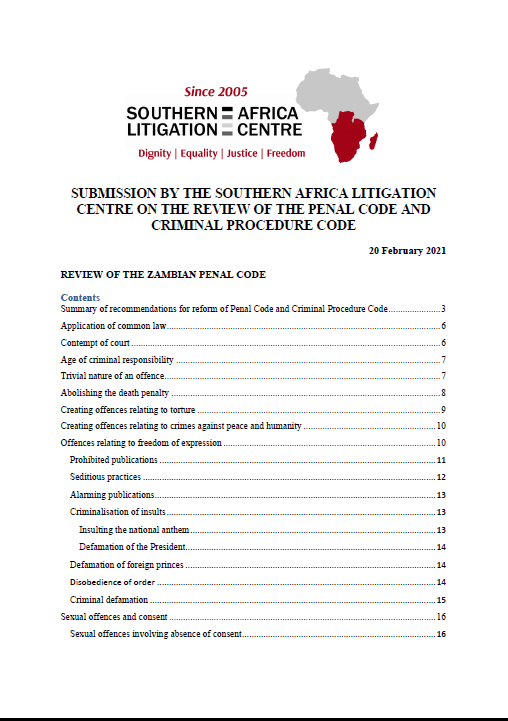The Southern Africa Litigation Centre (SALC)’s mission is to promote and advance human rights, democratic governance, rule of law and access to justice in Southern Africa through strategic litigation, advocacy and capacity strengthening. SALC works in Angola, Botswana, Democratic Republic of Congo, Eswatini, Lesotho, Malawi, Mozambique, Namibia, South Africa, Zambia and Zimbabwe. SALC makes the below submissions based on our technical expertise in the area of criminal law.
SALC draws the Commission’s attention to the Advisory Opinion issued by the African Commission on Human and Peoples’ Rights issued on 4 December 2020. The Advisory Opinion of the African Court relates specifically to sections 178 and 181 of the Penal Code and section 27 of the Criminal Procedure Code of Zambia. The African Court’s Advisory Opinion encouraged States to reconceptualise the basis of criminal laws and made the following observations:
- Offences which use the terms ‘rogue’, ‘vagabond’, ‘idle’ and ‘disorderly’ to label persons, are a reflection of an outdated and largely colonial perception of individuals without any rights and their use dehumanises and degrades individuals with a perceived lower status.
- Common terminology used in framing vagrancy offences include expressions such as ‘loitering’, ‘having no visible means of support’ and ‘failing to give a good account of oneself’ does not provide sufficient indication to the citizens on what the law prohibits while at the same time confers broad discretion on law enforcement agencies in terms of how to enforce vagrancy laws.
- The enforcement of vagrancy laws often results in pretextual arrests, arrests without warrants and illegal pre-trial detention.
- Arrests for vagrancy-related offences, where they occur without a warrant, are not only a disproportionate response to the socio-economic challenges but also discriminatory since they target individuals because of their economic status.
The African Court concluded that States Parties to the Charter have a positive obligation to “take all necessary measures, in the shortest possible time, to review all their laws and by-laws especially those providing for vagrancy-related offences, to amend and/or repeal any such laws and bring them in conformity with the provisions of the Charter, the Children’s Rights Charter and the Women’s Rights Charter.”
The African Court, in reaching its decision, relied on the African Commission on Human and Peoples’ Rights’ Principles on the Decriminalisation of Petty Offences, which set out the legal requirements against which any criminal offences should be measured.

